وورلد لوك اسبوع 52ـ 2015
في أوائل ديسمبر، كنت رئيس وفد اللجنة البرلمانية التي ذهبت إلى قمة المناخ في باريس. بعد رحلة قطار مستعجلة تلقينا ترحيبا حارا في مكتب الوفد الهولندي. مباشرة وفي اليوم الأول زرنا العديد من الأجنحة حيث تظهر البلدان كيف يواجهون تغير المناخ. كان هناك العديد من أوراش العمل والمحاضرات حول مواضيع مثل إزالة الغابات، الزراعة المستدامة، تسعير ثاني أكسيد الكربون وتمويل المناخ.
كان من الجيد أن نرى التركيز خلال هذه الأحداث الجانبية على إجراأت المناخ الملموسة. هذا ما ستراه إذا مشيت أمام ما يسمى مناطق أجيال المناخ مواقف عديدة من المنظمات غير الحكومية. على طول الطريق جذبت الأشجار المستقبلة للرياح، وبالتالي يمكنها توليد الطاقة الكثير من الاهتمام من جانب المشاركين في المؤتمر.
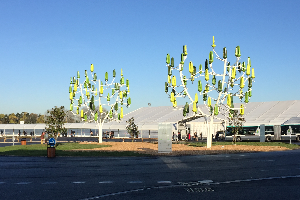 عشية قبل قمة المناخ، قمت بدعوة رئيس الوزراء مارك روت في مناقشة قضية تغير المناخ في البرلمان لإعطاء الاهتمام أثناء مناقشة قضية تغير المناخ وقمة المناخ أيضا لانبعاثات غازات الدفيئة الناجمة عن الثروة الحيوانية. يمكننا الآن تحقيق أسرع المكاسب بالمناخ بالتقليل من إستهلاك المنتجات الحيوانية والدعوة للزراعة المستدامة. في اتفاق المناخ الجديد لا وجود لإتفاقات بشأن الحد من إنبعاثات الغازات الدفيئة في الزراعة، لأنه ربما كما تعرف،الثروة الحيوانية السبب رقم واحد في انبعاثات الغازات الدفيئة في العالم.
عشية قبل قمة المناخ، قمت بدعوة رئيس الوزراء مارك روت في مناقشة قضية تغير المناخ في البرلمان لإعطاء الاهتمام أثناء مناقشة قضية تغير المناخ وقمة المناخ أيضا لانبعاثات غازات الدفيئة الناجمة عن الثروة الحيوانية. يمكننا الآن تحقيق أسرع المكاسب بالمناخ بالتقليل من إستهلاك المنتجات الحيوانية والدعوة للزراعة المستدامة. في اتفاق المناخ الجديد لا وجود لإتفاقات بشأن الحد من إنبعاثات الغازات الدفيئة في الزراعة، لأنه ربما كما تعرف،الثروة الحيوانية السبب رقم واحد في انبعاثات الغازات الدفيئة في العالم.
في باريس استفسرنا عن كيف يتم الإتفاق على المستوى الدولي بشأن الحد من انبعاثات غازات الدفيئة والتكيف مع تغير المناخ.أيضا أجرينا لقاءات مع رواد من مجتمع الأعمال الذين هم على قناعة بأن العمل كالمعتاد لم يعد خيارا،مثل الرئيس التنفيذي فايك سايبسما التابعة ل (دسم) مناجم الدولة الهولندية، وبيتر باكر للمجلس العالمي للتنمية المستدامة. هذه المعلومات التي يمكن استخدامها في المناقشات البرلمانية التي ستتبع بعد قمة المناخ. الآن اتفاق المناخ قد تم، يجب أيضا أن تترجم إلى أفعال!
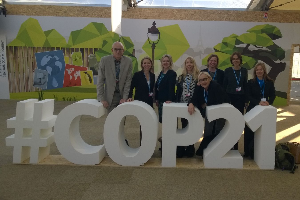
وفد مجلس النواب الهولندي في قمة المناخ في باريس
عرف هذا الشهر أيضا مناقشة مهمة في البرلمان حول الزراعة والطبيعة: مناقشة الميزانية. إلى جانب التركيز على الزراعة الصناعية، حيوانات التجارب والصيد، وقد طلبت من الحكومة إلى مواصلة الاستثمار في طبيعة منطقة الكاريبي التابعة لهولندا.حيث يعيش هنا 275 من الأنواع الحيوانية والنباتية. غالبا ما ينظر إلى الاستثمار في الطبيعة باعتبارها هواية مكلفة. ولكن الأبحاث تظهر أن كل يورو استثمرته الحكومة أكثر في الطبيعة يعود بالربح. هذا صحيح خصوصا في منطقة البحر الكاريبي حيث يتم تأسيس نموذج فريد من نوعه وخاصة يتميز بإستدامة الإيرادات التي هي بمثابة مثال للعديد من البلدان الأخرى.
طالبنا أيضا بالمزيد من التمويل للبحث في بدائل التجارب على الحيوانات. لا تزال مئات الملايين من اليورو تستثمر في الدراسات على حيوانات التجارب، ولكن الإختراقات الصحية الكبيرة تبقى خارج ذلك. يعترف أكثر وأكثر من العلماء أن التجارب على الحيوانات في الواقع غالبا ما تعيق التقدم الطبي. خلال هذه المناقشة طالبنا أيضا للحصول على تمويل إضافي لهيئة سلامة الغذاء الهولندية للإشراف على الرفق بالحيوان.
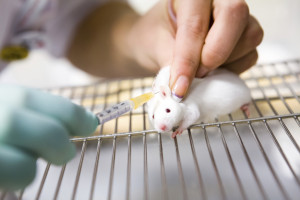
نتيجة لهذه المناقشات تحققت عدد من النجاحات الجميلة، مثلا وذلك بفضل اقتراحنا، يجب أن يكون حدا للتسمم القاسي في ذبح الخنازير بثاني أوكسيد الكاربون ويجب على الحكومة أن تحث المحافظات على وقف القتل الجماعي للإوز و إنشاء وسيلة فعالة وصديقة للحيوانات لحصر الأضرار في الحقول مع ما يسمى الليزر الزراعية.
هذا الاسبوع عملت أيضاعلى بث لسستڤ أمريكا حول تأثير صناعة الثروة الحيوانية على البيئة، جنبا إلى جنب مع كيب أندرسون. وهومنتج قرصنة الأبقار (كووسپيري)، فيلم وثائقي عن التأثير المدمر لصناعة الألبان بشأن تغير المناخ. المقابلة يمكن أن تشاهدها هنا.
بيتينا جونغ ومارتن بوسمان ء ممثلي حزب الشقيق في ألمانيا:حماية البيئة الحيوانية والإنسان جنبا إلى جنب مع ما يقرب من 30 عضوا قدموا عريضة مع 32000 توقيع ضد التجارب على الحيوانات في هامبورغ في بلدية المدينة في هامبورغ. عمل جيد جدا!
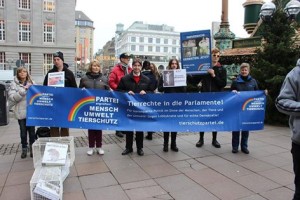
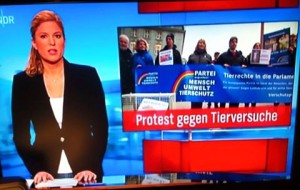
خالص تحياتي,
ماريان تيم
At the beginning of December, I was head of delegation of our Lower House committee joining the 2015 Climate Change Conference in Paris. After a successful train journey we received a warm welcome by the Dutch delegation office. Directly on our first day, we visited several pavilions where countries demonstrated how they were tackling climate change. In addition, there were many workshops and lectures on topics such as deforestation, sustainable agriculture, carbon pricing and climate funding.
It has been rewarding to see that the focus during these side events was on concrete climate action. A stroll past the numerous NGO stands in the so-called Climate Generation Areas confirmed this. On our way there, trees catching wind and thereby able to produce energy, attracted a lot of attention from the conference participants.

On the eve of the climate conference, I urged Prime Minister Rutte during our climate debate in Parliament to also give consideration to the greenhouse gas emissions caused by livestock farming during the climate debate and the climate conference. By far the most climate benefits can be achieved by eating less animal products and by advocating sustainable agriculture. The new climate deal does not mention agreements on reducing greenhouse gases in agriculture, and as you may already know, livestock farming is the number one cause of greenhouse gas emissions in the world.
In Paris, we have obtained information on how agreements are reached at an international level about reducing greenhouse gases and adapting to climate change. We have also held discussions with business pioneers including CEO Fijke Sijbesma of DSM (Dutch Sciences Company) and Mr Peter Bakker of the World Council for Sustainable Development, who strongly believe that business as usual is no longer an option. We will be able to use this information during the Dutch Lower House debates following the climate conference. After all, now the climate deal has been accepted, it is time to take action!
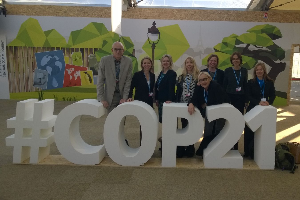
Our Lower House delegation at the climate conference in Paris
December has also been the month of the most important Lower House debate on agriculture and nature: the budgetary debate. As well as attention for factory farming, animal testing and hunting, I have asked the government to keep investing in Dutch Caribbean wildlife. These islands are the habitat of no less than 275 animal and plant species. Investing in plants and wildlife is often considered to be an expensive hobby. However, research has shown that each penny spent by the government on wildlife more than pays for itself. This is certainly the case with the Caribbean islands, where a unique and above all sustainable income model has been created, which serves as a model for many other countries.
We have also called for more funding for alternatives to animal testing. Although hundreds of millions of euros are invested in animal testing, there still have not been any major health breakthroughs. More and more scientists have admitted that in many cases, animal testing is in fact slowing down medical advances. During the debate, we have also called for an additional budget for the Netherlands Food and Consumer Product Safety Authority to be used for monitoring animal welfare.

The debate has led to some successful results: for a start, our motion will put an end to the cruel carbon dioxide stunning of pigs in slaughterhouses. In addition, our government must stimulate the provinces to stop the massive killing of geese and commit themselves to a more effective and animal friendly way of damage control on the fields by means of the so-called Agrilaser.
This week I have also worked with Kip Andersen on an episode of CCTV America about the impact of livestock on the environment. Andersen is the director of Cowspiracy, a documentary on the devastating impact of dairy farming on climate change. You can watch the interview here.
Bettina Jung and Martin Buschmann – representatives of our German sister party Partei Mensch Umwelt Tierschutz – together with about 30 other members have handed over a 32,000-signature petition against animal testing in Hamburg at the City Hall of Hamburg. A great step!


Kind regards,
Marianne